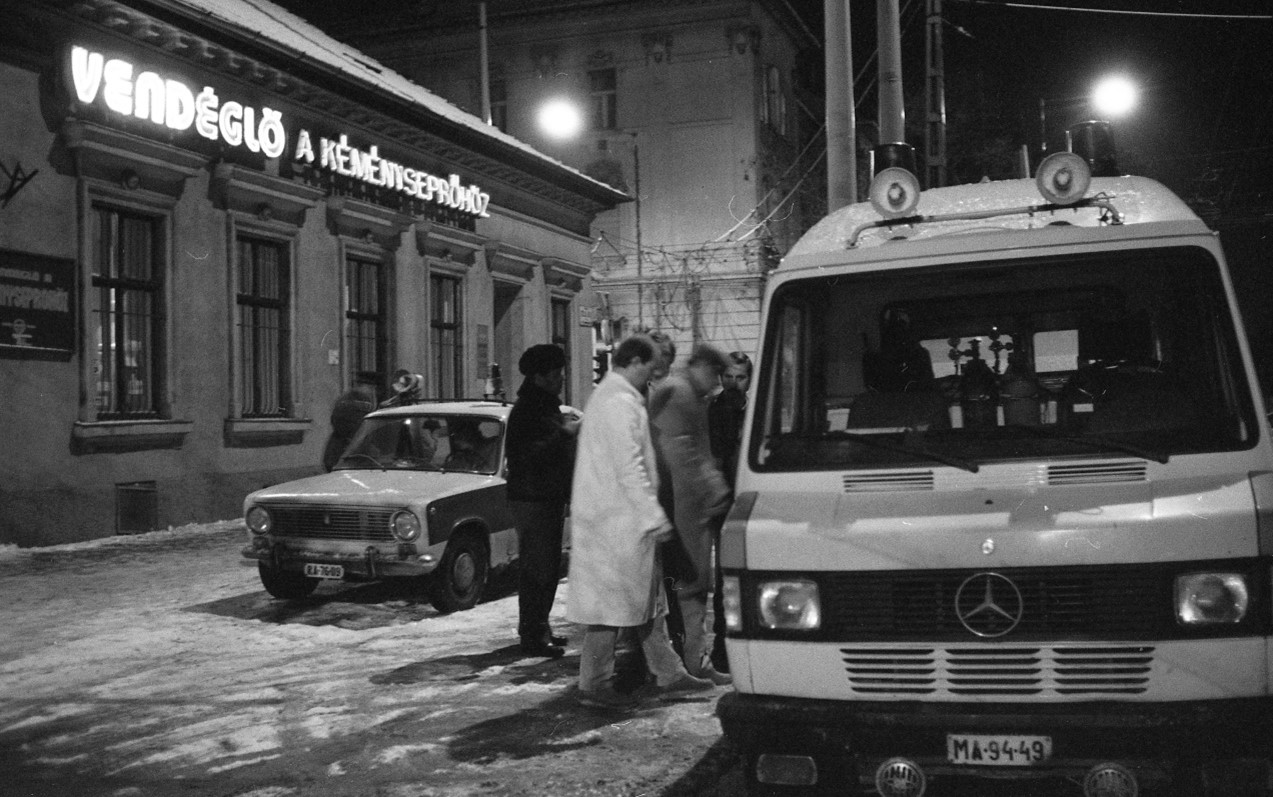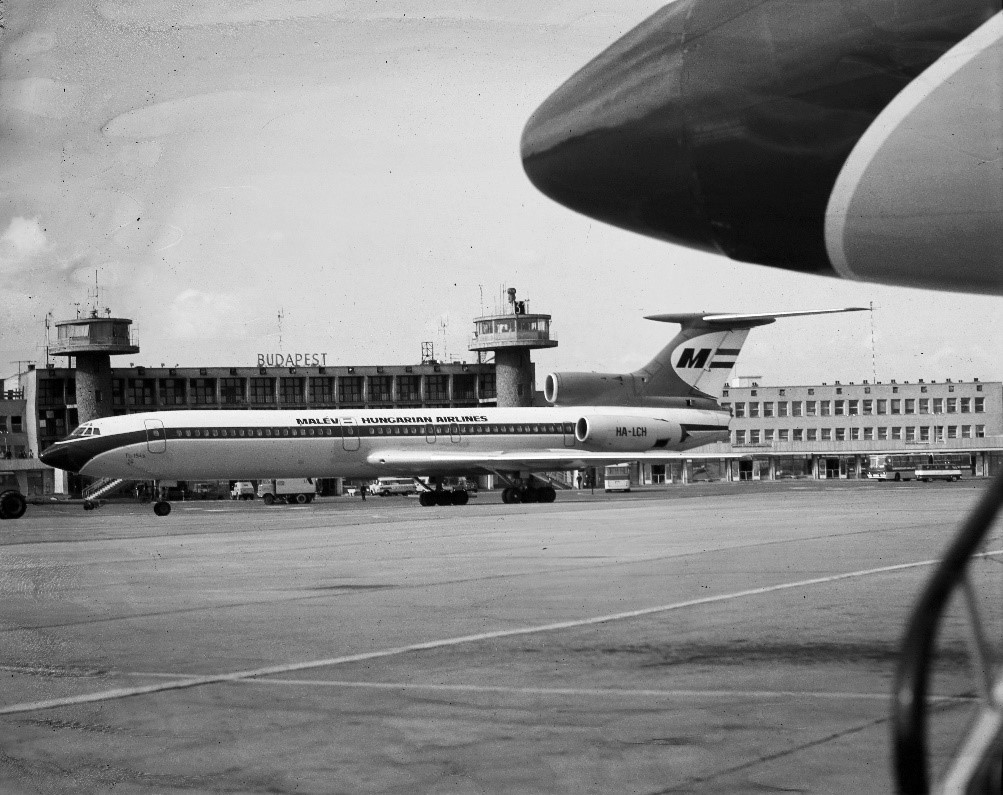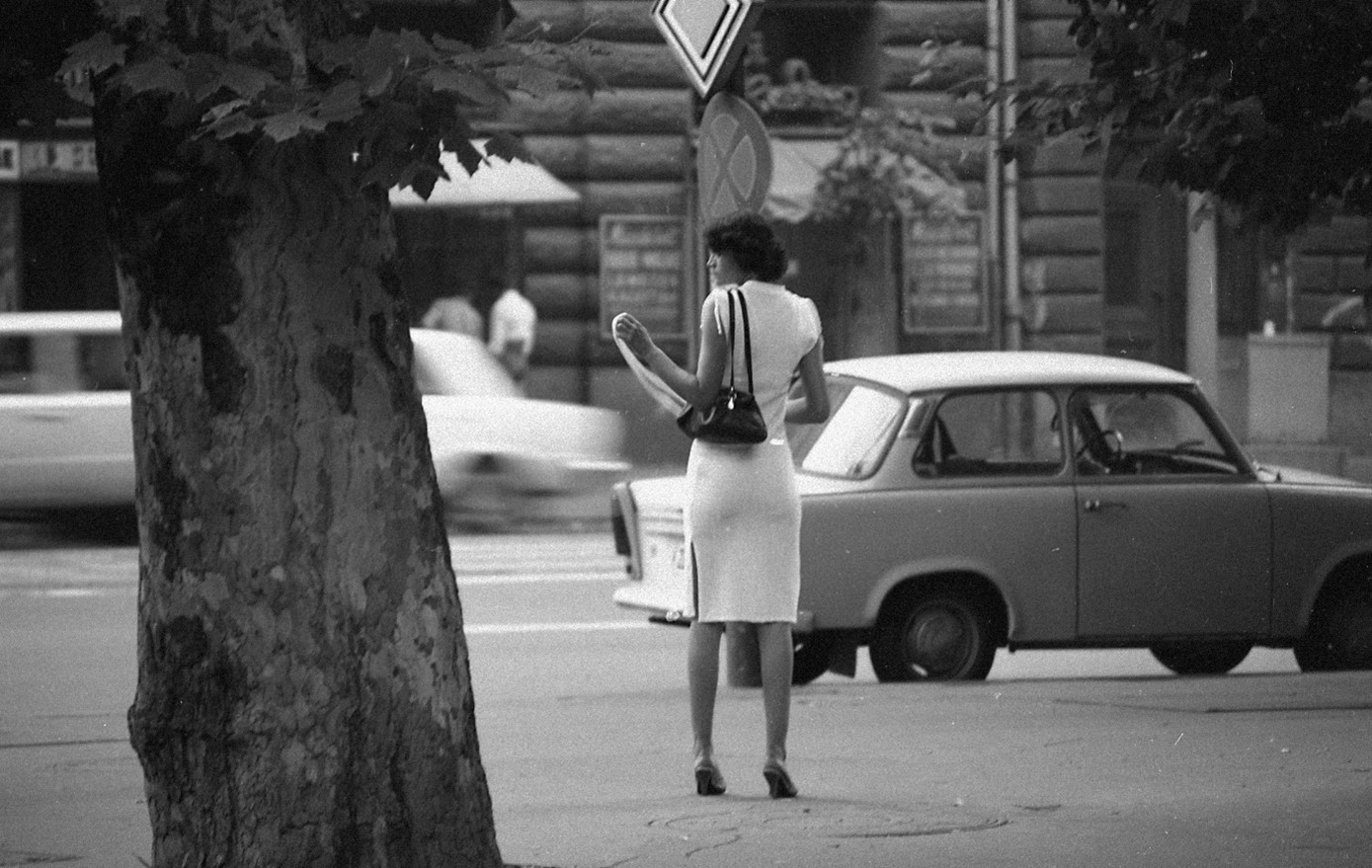'An Englishwoman's Life in Communist Hungary': Chapter 3, Part 7.
- 17 Jan 2023 7:49 AM

Now You See It, Now You Don’t and House of Cards have been included as part of the Open Society Archive dedicated to this period in the CEU. You can read a serialisation of them here on Xpatloop. You can also buy the dual-volume book on Kindle as well as in Stanfords London.
Chapter three: Market and May Day: Garay tér
Part 7 – The Chimneysweep restaurant; first return visit to England
The week of our departure for England arrived. We had decided to leave a letter in the flat for Zoli-bácsi 's daughter and her husband, who were apparently to visit while we were away.
Rózsi-néni came to collect the rent, saying Zoli-bácsi was ill, and told us that unless her daughter managed to pass the Canadian medical examinations enabling her to work there, they would probably return to Hungary.
She was perfectly pleasant, wishing us a good trip home and then, just as we got to the front door she said, ‘You know I'd like you to stay here in the flat, you've made it so nice and you're such nice people, but it's my husband - he doesn't want you to stay.’
Then she smiled wanly, shrugged her shoulders, and left.
Endre and Kati turned up on the evening before we left. We had decided not to cook but to go out somewhere nearby to eat and invited them to come with us.
Several times I had passed a restaurant on Dózsa György út called the Kéményseprő (Chimneysweep), which had an area with tables outside under the trees. It looked like a place much frequented by locals, usually a guarantee of good food.
We walked the short distance, telling Endre of Rózsi-néni's visit.
‘They'll never come back,’ said Kati.
‘In Canada they've got a big house, a car, a boat; the children both go to school there and speak fluent English. Can you imagine them leaving all that to come back to Garay tér?’ Endre asked scornfully.
The fact that we were fond of Garay tér and the area was a source of amazement to Endre, not surprisingly, since he had grown up in one of the back streets in a flat consisting of one room and a kitchen, with a key to a bathroom on the outside walkway around the courtyard.
This froze in winter and had to be shared with several other families. He was frequently to be heard wishing the whole area would be bulldozed to the ground, much preferring the comfortable, though totally characterless, high-rise blocks that had replaced such housing in other areas of the city.
We arrived at the restaurant. It was a large, low, stone building with green, flaking paint on the trelliswork in the 'garden' area. In the middle was a small round bandstand in which stood a cimbalom, some stools and one or two instrument cases.
A few people were eating, and we found ourselves a table surrounded on three sides by vine-covered trelliswork.
There was a row of these 'boxes', as they were called, going right round the garden; in one of them two or three tables away, an argument was going on.
The waiter brought us the menu and we chose our food and wine, then watched as the gypsy band arrived to play.
Kati groaned: like most Hungarians she found the music irritating, especially because it was usually so loud that it was impossible to hold any kind of conversation. It did not stop Endre however, whose hearty laughter could be heard above the sound of the band.
Suddenly, there was a voice behind us and a face peered through at us from the other side of the trellis. It was Endre's mother.
She had heard his laugh as she was walking by, but confessed surprised distaste at finding him in 'such a place'. We admitted to having invited them there with us, and pulled up another wooden-slatted chair for her.
She declined any food, and pulled out a letter from her bag, asking Endre to translate it for her since it was in Polish. He had to shout to make himself heard, trying at the same time to eat his food while it was still hot.
Meanwhile, the two men who had been arguing nearby had moved over to the bandstand, still shouting at each other. Endre finished translating the letter, but his mother wanted him to write a reply for her in Polish.
She too had to shriek to make herself heard and several times shook her head shouting, ‘Why do you come to a place like this? Do you really like it?’
Endre told her how much we enjoyed living at Garay tér, which seemed to confirm all her worst suspicions.
The food was excellent as I had suspected. But it was true that the Chimneysweep had a rather dubious clientele.
The two arguing men were now pushing each other around, heading, unfortunately, in our direction. Watching from the door of the building were two women who could also have been involved in some way.
One of the two men had earlier asked the gypsy musicians to play a particular song for them, something which is always tipped.
So, not to be done out of their money, the two violinists and the clarinettist followed the scuffling men around the garden, continuing to play the requested piece, just five paces behind.
The fight reached us, one man pushing the other backwards on to the table, and we hastily removed our plates and glasses to a safe distance. Endre's mother jumped up and Kati burst out, ‘Why do you have to fight here, on our table?
Can't you see we're trying to eat? For heaven's sake!’ At this they stopped, stood up straight, and said, ‘Sorry, sorry, excuse us,’ and nodding an apology to us all, walked over to the other side of the garden where they continued their scuffle, still escorted by their serenaders.
Endre's mother gave up and decided to leave, making Endre promise to call in later and complete the letter. We finished eating, paid, and headed for home to finish our packing.

Police and an ambulance escort someone from The Chimneysweep Restaurant
Courtesy Fortepan/ Magyar Rendőr
***
July and August were spent in England. Maybe the strangest feeling after a year away was the simple fact that we could understand everything everybody was saying.
It was a relief to sink back into automatic reactions to situations, conversations which required no effort, shops where you could buy what you wanted when you needed it and the pervading simplicity of everyday life.
Yet after that initial relief followed a restlessness, an irritation with the grey weather, a feeling that life was too easy, too routine, too 'nice'; it lacked the struggle, the intensity and ultimately the colour of Hungarian life.
It made no demands on the abilities and reserves of character we had only discovered in ourselves during the previous year, and personal relationships seemed weak in a society where everyone could, and did, manage their everyday lives without the help of their friends.
Thus it was with mixed feelings of trepidation and excitement that we returned to Budapest at the end of August.
Miklós was there to meet us at the airport, flowers in hand, like most people waiting to meet friends and relatives. It was still as hot, dry and dusty as when we had left.
‘So, what do you notice first now that you're back?’ asked Miklós, as we pushed our way through the milling throngs around the door leading from the customs hall.
‘Three smells,’ I replied, ‘Hungarian coffee, Hungarian cigarettes and the pollution from the cars.’

Ferihegy Airport Courtesy Fortepan/ UVATERV
We got a taxi from the airport. The grass and shrubs were brown, parched by the continual sunshine and three months without rain.
We arrived back at the flat and collected the keys from Manci-néni.
She had offered to water the plants and bring up our letters from the mailbox while we were away, and it was obvious as soon as we walked in that she had also cleaned the flat for us.
Miklós stayed half an hour and had a drink and a cigarette, then left, telling us that Rézi was expecting us to go and eat there that evening.
We looked around; nothing had changed. We went through the mail which included a note from Endre saying he would be coming to see us soon, some postcards from both English and Hungarian friends and a few letters.
One of the postcards was from someone called Virginia. We were astounded to read that she was from California, had married a Hungarian Calvinist minister whom she had met in Chicago, and had just come to live in Dabas.
At the theological college in Chicago she had also met an English friend of ours who had gone there to study - it was he who had given her our address. She was keen to meet us and asked us to write suggesting a possible time.
We unpacked some things, opened the blinds and windows and then just stood and gazed at the familiar scene below.
There was a knock and the door opened. Manci-néni had just baked some doughnuts and invited us to go and have some, so we left our re-acquaintance with the market and went next door.
Their flat had two large rooms and was spotlessly clean and tidy. Colourfully embroidered cushions were piled on chairs and sofa, and every available inch of shelf space was crammed with ornaments and dolls in national costume.
Proudly, they showed us a music-box gondola they had bought in Venice which played O sole mio.
Their budgie was perched on the standard lamp - they had no children and were absolutely delighted the day that the bird had flown into their kitchen and made itself at home. Its favourite trick was to fly down and perch on Feri-bácsi's beer glass and drink from it.
Manci-néni brought a large plate piled high with warm doughnuts, along with coffee, tonic water and small savoury scones.
They told us that they had had a family to stay with them from East Germany, people they had met the previous year on a campsite there. However, the Germans spoke no word of Hungarian, nor they a word of German, but they laughed and said they had had a good time, and that if it was desperate they always had a dictionary.
They told us with pride how amazed the Germans had been at the variety and quantity of fruit and vegetables in the markets.
Apparently, the food was the only part of their holiday in East Germany that had been a trial for Manci-néni and Feri-bácsi. Like all Hungarians travelling abroad though, they had taken a good supply of salami and tinned food with them.
They told us that they had seen Zoli-bácsi and Rózsi-néni with their daughter and her family, and how wild and spoilt the children were.
Though they had not stayed in the flat, we later found our small radio broken, presumably by the children. It seemed that the family from Canada were quite happy there and had no objection to our staying in the flat, but had not left any messages for us.
Time was getting on, and Manci-néni had to leave for her afternoon job of selling the Budapest evening newspaper near Keleti station.
Like most pensioners, they simply would not have been able to manage on their state pension and so supplemented their income in whatever way they could. We gave them a few small gifts we had brought from England, and then left to buy some wine and go to Miklós's.

Rákóczi tér Courtesy Fortepan/ Magyar Rendőr
On the corner of Rákóczi tér Paul decided to buy some flowers for Rézi, but I saw Miklós waving and beckoning from his balcony, so I went on ahead.
Miklós, Rézi and I stood and watched from the balcony as Paul took his flowers and walked towards us.
Standing outside the building next door was one of the regular girls - black skirt, satin blouse and handbag slung carelessly over one shoulder - and as Paul approached, we saw her go up to him and say something. He paused, shook his head, and looking somewhat embarrassed walked on while the girl sauntered on to the corner.
‘Well, how much?’ asked Miklós.
‘I don't know,’ said Paul, ‘She just asked me if I wanted to go with her.’
‘Oh, you English!’ said Miklós in his usual mock-sarcastic way.
Click here for earlier extracts
Main photo: The Chimneysweep Restaurant Courtesy Fortepan/ Magyar Rendőr


























LATEST NEWS IN community & culture